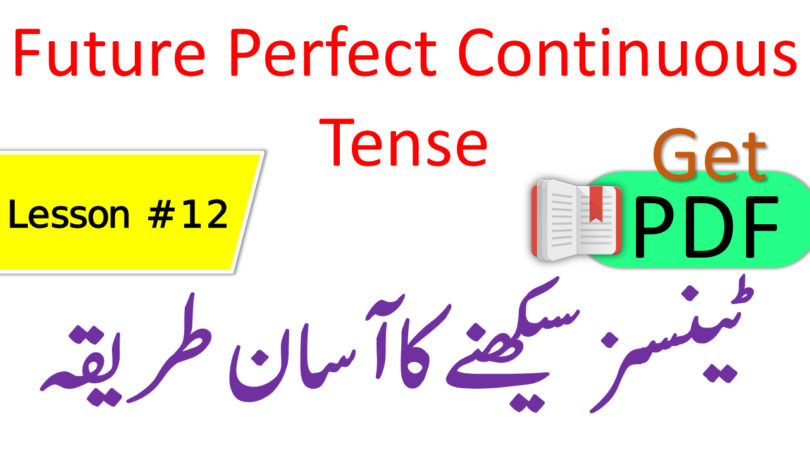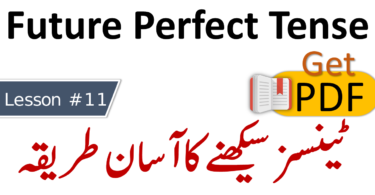Future Perfect Continuous Tense is used to describe an ongoing action that will continue up to a certain point in the future. It highlights the duration of an action using time expressions like “since” and “for.” Future Perfect Continuous Tense in Urdu with Examples is often used to emphasize how long something will have been happening before a specific time in the future. For more lessons, visit our grammar section!
Table of Contents
Future Perfect Continuous Tense in Urdu
Future Perfect Continuous Tense is used to describe ongoing actions that will continue until a certain time in the future. Understanding its structure, rules, and usage will help you speak and write English more accurately.
✅ Affirmative Sentences (مثبت فقرات)
Sentence Structure:
Subject + will/shall + have been + Verb(-ing) + Object + since/for + Time Expression
Examples:
- He will have been doing work for three days.
وہ تین دن سے کام کر رہا ہوگا۔ - She will have been making tea for five minutes.
وہ پانچ منٹ سے چائے بنا رہی ہوگی۔ - It will have been raining since morning.
صبح سے بارش ہو رہی ہوگی۔ - We shall have been studying since last night.
ہم رات سے مطالعہ کر رہے ہوں گے۔
❌ Negative Sentences (منفی فقرات)
Sentence Structure:
Subject + will/shall + not + have been + Verb(-ing) + Object + since/for + Time Expression
Examples:
- He will not have been catching fish for two hours.
وہ دو گھنٹے سے مچھلیاں نہیں پکڑ رہا ہوگا۔ - She will not have been cooking for an hour.
وہ ایک گھنٹے سے کھانا نہیں بنا رہی ہوگی۔ - They will not have been playing hockey since morning.
وہ صبح سے ہاکی نہیں کھیل رہے ہوں گے۔ - Ali will not have been going there since June.
علی جون سے وہاں نہیں جا رہا ہوگا۔
❓ Interrogative Sentences (سوالیہ فقرات)
Sentence Structure:
Will/Shall + Subject + have been + Verb(-ing) + Object + since/for + Time Expression?
Examples:
- Will he have been going to the office for one month?
کیا وہ ایک ماہ سے دفتر جا رہا ہوگا؟ - Will she have been sewing this suit for two days?
کیا وہ دو دن سے یہ سوٹ سی رہی ہوگی؟ - Will the washerman have been washing clothes since noon?
کیا دھوبی دوپہر سے کپڑے دھو رہا ہوگا؟ - Will it have been snowing in Murree since November?
کیا مری میں نومبر سے برف باری ہو رہی ہوگی؟
Use of “Since” and “For” in Future Perfect Continuous Tense
In this tense, “since” and “for” are essential to indicate time duration.
| Usage | When to Use | Examples |
|---|---|---|
| Since | Used for a specific point in time (e.g., since morning, since 2010). | He will have been working since Monday. (وہ سوموار سے کام کر رہا ہوگا۔) |
| For | Used for a period of time (e.g., for two hours, for five years). | She will have been cooking for three hours. (وہ تین گھنٹے سے کھانا بنا رہی ہوگی۔) |
Key Uses of Future Perfect Continuous Tense
✔️ To show an action that will be in progress up to a future point:
Example: By next year, he will have been working here for ten years.
✔️ To emphasize duration or time length:
Example: She will have been studying for five hours before the exam.
✔️ To describe actions that will be ongoing at a particular time in the future:
Example: At 5 PM, we will have been waiting for two hours.
Common Mistakes to Avoid
🚫 Using Present or Past Tense Instead of Future:
Incorrect: He is working for two hours.
✅ Correct: He will have been working for two hours.
🚫 Forgetting “Have Been” in the Sentence:
Incorrect: She will be cooking for an hour.
✅ Correct: She will have been cooking for an hour.
🚫 Confusing “Since” and “For”:
Incorrect: He will have been working for Monday.
✅ Correct: He will have been working since Monday.
You May Also Like





